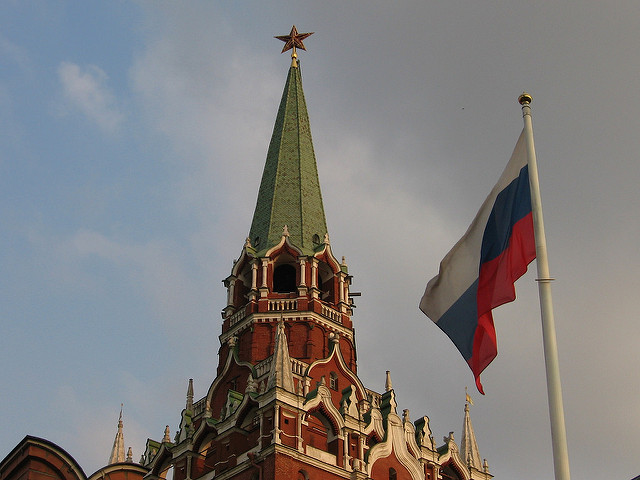We need to have a little talk. We’re panicking, you and I. We didn’t think Donald Trump would actually win. And we see that his administration has been an abomination so far. His reckless greed and racism are bad for the United States and bad for the world.
But this panic has recently morphed into something else entirely: Russophobia, the last remaining phobia still acceptable in the progressive mainstream.
Trump profits, sometimes literally, from stirring up fear. We agree that this use of xenophobia is bad, right? That’s why people were out protesting at airports in the first week of his presidency. But if xenophobia is bad, isn’t it bad even when directed against Russians?
I’m an immigration lawyer and, as such, I deal with government-imposed, official xenophobia on a daily basis. For example, the government decides which foreigners visiting the U.S. need visas and which don’t. And after 9/11, the Justice Department required foreigners from “Muslim” countries to be re-fingerprinted. In other words, I know it when I see it.
And what I’m seeing now? We’re living in the Rocky and Bullwinkle cartoon and Boris and Natasha are once again trying to kill our favorite flying squirrel. From my outpost here in Belgorod, Russia, where I’m spending the school year, this looks equal parts preposterous and dispiriting. Are we really going to go through this all again?
“But!” you say, “Russia is responsible for making Trump the President! So they truly are very evil.” I’m not here to debunk each and every wild claim about Russia floating around, such as the idea that Russia “hacked” our election or that the Kremlin is blackmailing Donald Trump with a sex tape.
That has exhaustively been done elsewhere by reputable professionals. Journalists like Andrew Cockburn in Harper’s, Masha Gessen in The New York Review of Books and Matt Taibbi in Rolling Stone have begged for calm and caution in the face of an avalanche of anti-Russia recriminations. Yet their measured voices have been lost in the cacophony of public discourse today, a deafening racket that keeps us from hearing the truth: it is not the Russians but we Americans who are to blame for electing Donald Trump.
But even if every outrageous accusation about Russia turns out to be true, what I’m asking you to remember is that Russia is made up of 144 million human beings. Young and old, rich and poor, smart and not-so, kind and not-so. Lovers of beets, pickles, accordions and fish. Descendants of the soldiers who saved us all from the Nazis.
“Oh I know that,” you say. “I’m not blaming the Russian people. I’m sure some of them are very nice.” But that’s the thing about Russophobia. It seeps in gradually, unconsciously, largely because of blindness. You can’t see what you aren’t shown, and who is shown everyday Russian life? Intellectually we all know that Putin is one man and is not the entirety of Russia, but a national frenzy can make you forget that.
When I was a teaching assistant in a university Russian department in the 1990s, my cohort and I sometimes enjoyed poking gentle fun at the cluelessness of the undergraduates we taught. My friend taught “Russia Today,” a course designed to catch students up on current events in the Wild East and which assumed no prior experience with the subject. I don’t know which was sadder: a certain test question: “Where is Russia geographically in relation to the United States?” or the poor numbskull who wrote the only possible wrong answer: “south.”
That same course required students to write about visual artifacts, such as photographs and paintings. One student, reacting to an image of a young girl walking to school on a sunny day, wrote something along the lines of, “This is clearly propaganda because in the Soviet Union everything was gray.” We laughed long and hard at that one, unable to discern whether the student was sacrificing test points in the service of an ironic joke or truly believed that communism had somehow blotted out the sun.
But that student really had tapped into unconscious beliefs that we all had about the Soviet Union during the Cold War: it was mostly gray there. Sometimes red, but mostly gray. People there used a weird alphabet, a backwards one, perhaps better to summon demons with. No one there ever laughed, except maybe to cackle at us. It was a bad place filled with bad people who wanted to destroy us.
These themes are returning with a vengeance. When reporting on the expulsion of Russian diplomats and the closing of their U.S. retreats, The New York Times offered this ominous information about The Russians Next Door: apparently, they did not cook crabs by tossing them alive into boiling water. Instead, “They stab them with a screwdriver, break the back shell off, clean them and then boil the body.” NBC’s report on the expulsion told how a neighborhood woman once lost her dog and a “man with a Russian accent” phoned to tell her to come pick it up.
Those sneaky, accent-having, crab-eating Russians! Who can trust them?
While Americans freak out about all the no-goodniks over here in Russia, people in my town were doing such outrageous things as bragging about going for a jog and complaining about the quality of the peanut butter for sale at the organic food store. Every morning on my way to work, I pass a young mother pulling her giggling one-year-old on a sled. Someone decorated the elevator in my apartment building with a needlepoint still life with fruit. My downstairs neighbor practices the piano loudly, but she is very good so I do not mind. In other words, people are over here leading absolutely ordinary lives, ones filled with both sadness and good humor, Lives just like yours.
We know that xenophobia is what leads people to build internment camps, leads people to commit genocide, makes war an easier sell. Xenophobia is the worst part of ourselves, and, arguably, the worst part of Donald Trump. We can’t give into it, we just can’t. Or else we lose precisely those qualities that win: unity, empathy, and solidarity.
Lead photo by Sean Murphy. Published under a Creative Commons License. Additional photos courtesy of the author.









1 comment
Comments are closed.